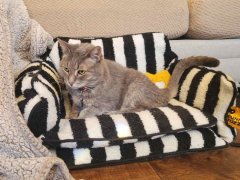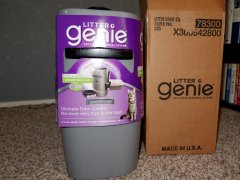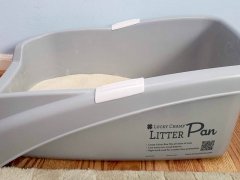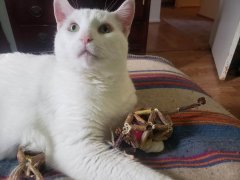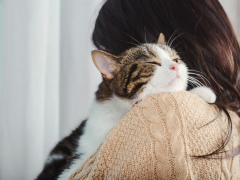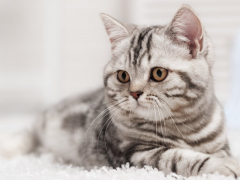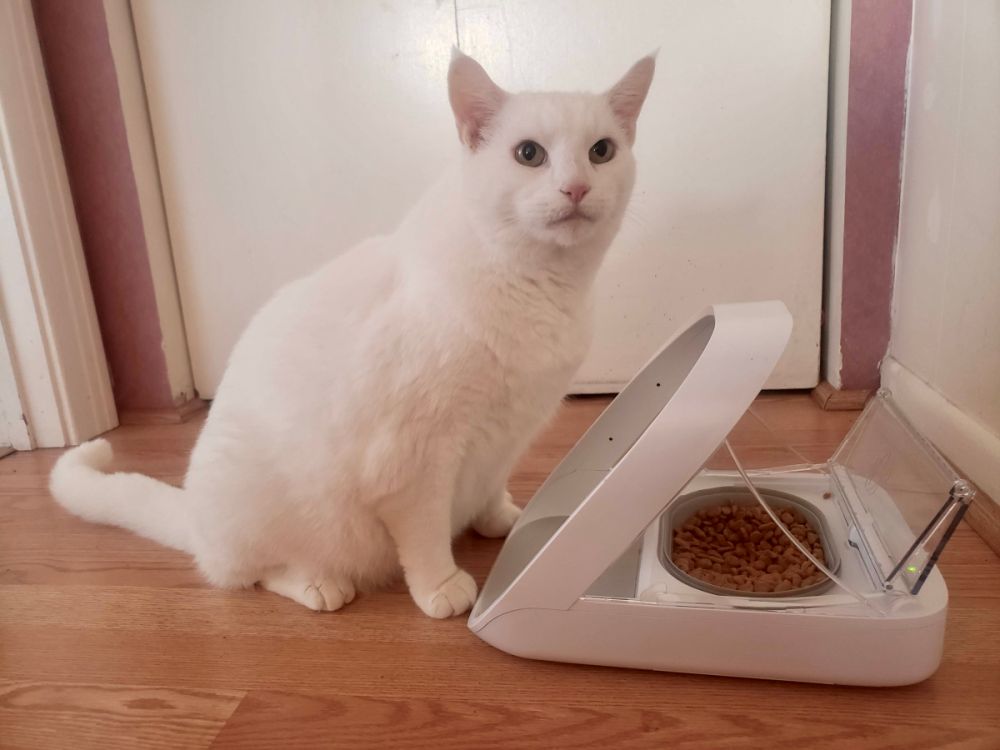
Liz Coleman / Cats.com
The Cats.com Standard—Rating Surefeed Microchip Pet Feeder on What Matters
We’ve rated the brand on five key criteria for quality. Here’s how it rates in each of these five crucial areas.
Ratings
- Ease of Setup: 10/10
- Construction: 8/10
- Ease of Cleaning: 7/10
- Appearance: 10/10
- Price: 4/10
Overall Score: 7.8/10
Why Trust Cats.com
As a cat product reviewer and lifelong cat parent, I understand the utility of microchip feeders—as well as the features that will be most important to cats and their people. For this review, I relied on extensive research and feedback from my own discerning cat to get an idea of how the SureFeed Microchip Feeder might work for other pet parents. Ultimately, I wanted to learn: does this feeder really work? And is the steep price justified?
To find out, I examined the SureFeed closely on several fronts. First, I observed how involved the setup process was. Then, over the course of several weeks, I spent a fair amount of time acquainting my cat, Floyd, with the device. I took note of details like the size, noise level, materials, and design considerations. I also broke the unit down for cleaning to see how practical this would be.
In addition, I combed through dozens of customer reviews to get a sense of what other cat parents had to say—things they liked, areas that could use improving, and how the feeder worked for them overall.
SureFeed Microchip Feeder and Sure Petcare Overview
Sure Petcare got its start in 2008 when the brand launched its first product: the SureFlap Microchip Cat Flap. Developed by Cambridge physicist Nick Hill, this electronic cat door was designed to keep unauthorized pets out of your home.
In 2014, the company applied this technology to cat food bowls, and the SureFeed Microchip Feeder was introduced. This novel device stands alone as one of the only microchip feeders on the market (the only other one I could find was the Closer Pets MiBowl.) It’s ideal for curbing food stealing in multi-pet homes, and it helps ensure the right cat is getting the right food.
To showcase its growing range of products, the company changed its name from SureFlap to Sure Petcare in 2017. This same year, the Feeder Connect was launched: an updated microchip feeder that offers insights into eating patterns by connecting to the Sure Petcare app with an internet Hub (sold separately). Sure Petcare also carries a microchip-enabled water fountain that monitors your pet’s water intake and an activity tracker for dogs.
SureFeed Microchip Feeder Features
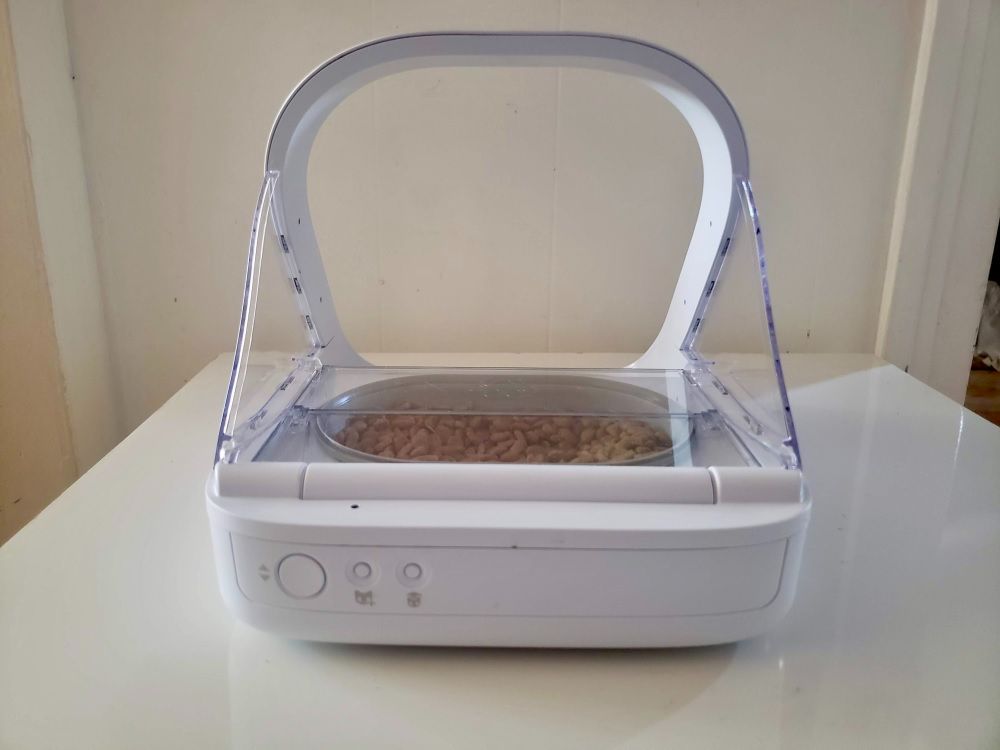
Liz Coleman / Cats.com
Unlike other automatic feeders, the goal of the Surefeed is to control food access in multi-pet homes. Using microchip sensors, it thwarts would-be food thieves by only opening for designated pets—keeping out other cats, dogs, and even curious toddlers.
The arch over the food bowl contains a chip-reading sensor. Once you program your cat (a straightforward & fast process), the feeder will open when they stick their head under the arch. Once the authorized cat moves away, the feeder’s door slides shut. Alternatively, cats without a microchip can use the included RFID collar tag. If you have a few cats who share food, you can program up to 32 pets.
The Surefeed operates on 4 C batteries, which the company says will last at least six months. While batteries provide flexibility in terms of feeder placement, they also represent an added expense. Some users were understandably miffed that you can’t plug this device into the wall.
This device comes with a hefty price tag, but it will be worth it for the right person and the right circumstances. Food-stealing can be a serious headache in multi-pet homes, and this feeder frees up pet parents who would otherwise need to supervise meal time. What’s more, it keeps pets healthy by ensuring they get the right food—an especially important consideration when expensive prescription diets are on the menu.
What We Liked
- Comes with two bowls: one divided bowl and one single bowl
- Surprisingly lightweight
- Easy to program
- Neoprene lip around bowl forms a seal to retain moisture and freshness
- Sleek, modern design
What We Didn’t Like
- Expensive, especially if you need to purchase more than one for multiple feline thieves
- Bowls are plastic instead of stainless steel
- Colored bowls and mats must be purchased separately
- Kibble can get stuck under the lid, causing it to not shut properly
- Battery-operated, no plug-in option
- Can be difficult to clean
What Did Our Test Cats Think?
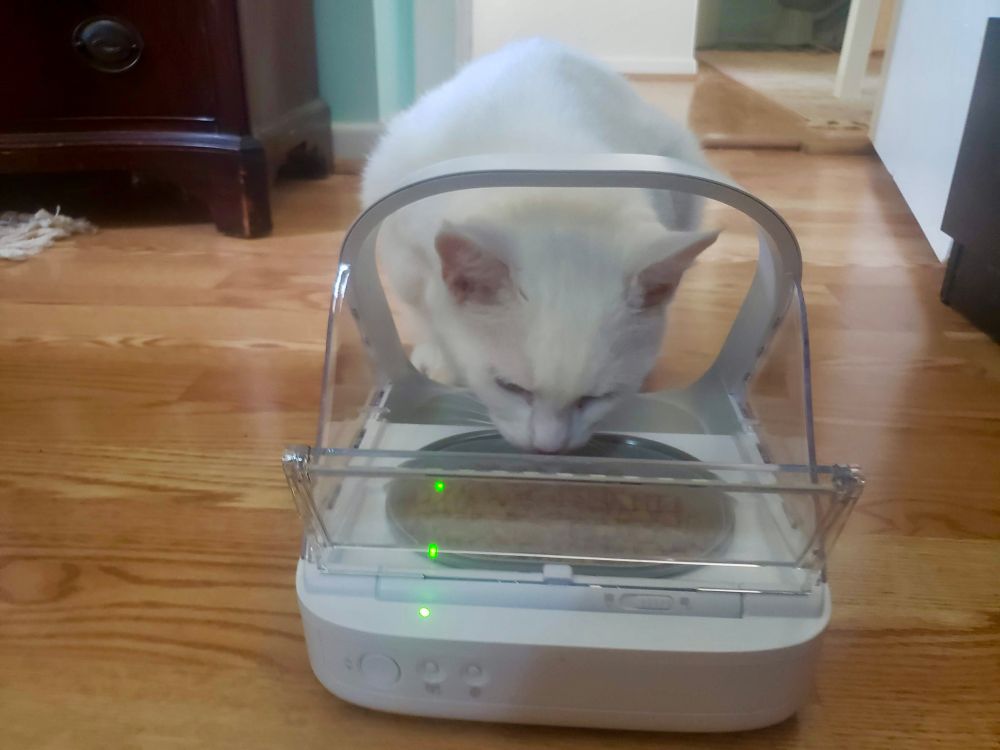
Liz Coleman/Cats.com
Reception of the SureFeed was a mixed bag in our household. Personally, I was super impressed with the technology behind this feeder: I’ve never seen anything quite like it! That said, I do think it comes with a few design flaws I’d love to see the company address (along with a lot of other like-minded pet parents).
Initially, I thought setting things up would be trickier, but I found it was quick and easy to program my cat. And even though we didn’t use it, I programmed the included RFID tag, which was equally simple. The tag was small and lightweight, which tinier felines will appreciate.
As for my cat, it took some getting used to. But I think if I needed to use this long-term, he could get on board. Absolutely, there’s a learning curve to this feeder. Some cats will acclimate within a day—others may need as long as two weeks. Either way, you’ll have to put some time and effort into training cats to use it.
For hesitant cats, there’s a training mode that closes the lid incrementally. This was incredibly helpful for Floyd. When the lid was fully closed, he didn’t understand that putting his head under the sensor would open it. But leaving the lid partially open was enough to coax him under the arch, and voilà—instant access.
Like any piece of motorized technology, the SureFeed could be frightening for nervous cats with an aversion to new things. However, I thought it was quiet enough, and my cat was undisturbed by the sounds or movement. While he’s on the larger side, Floyd fit just fine under the chip reader—though others complained that the arch was a tight squeeze for their big cat.
There are three different timer settings for closing the lid. Scaredy cats may prefer the slowest setting, so the movement is less likely to frighten them away. However, greedy kitties may swoop in and grab a mouthful or two from their sibling in that time. In that case, you can switch to the fastest setting, so the lid closes right after the designated kitty steps away.
Also, the curved sides leave a gap, allowing determined cats with dexterous paws to swipe at the kibble. Some folks got pretty creative when it came to this issue. Some placed the feeder in a tall box to cover the back. Others put it in a carrier to prevent pilfering. If you’re not opposed to shelling out another $40, you can purchase a rear cover separately. Though, I’d prefer to see this integrated into the actual device, especially considering how expensive it is.
When using kibble, clean-up is very straightforward. However, if you have a messy cat who flings wet food around, you could run into trouble. The bowl, mat, and lid are hand wash only. The feeder itself should be wiped down frequently with a damp cloth. Dried wet food can be tricky to scrub out of all crevises without letting water into the feeder.
What Do Customers Think of the SureFeed Microchip Pet Feeder?
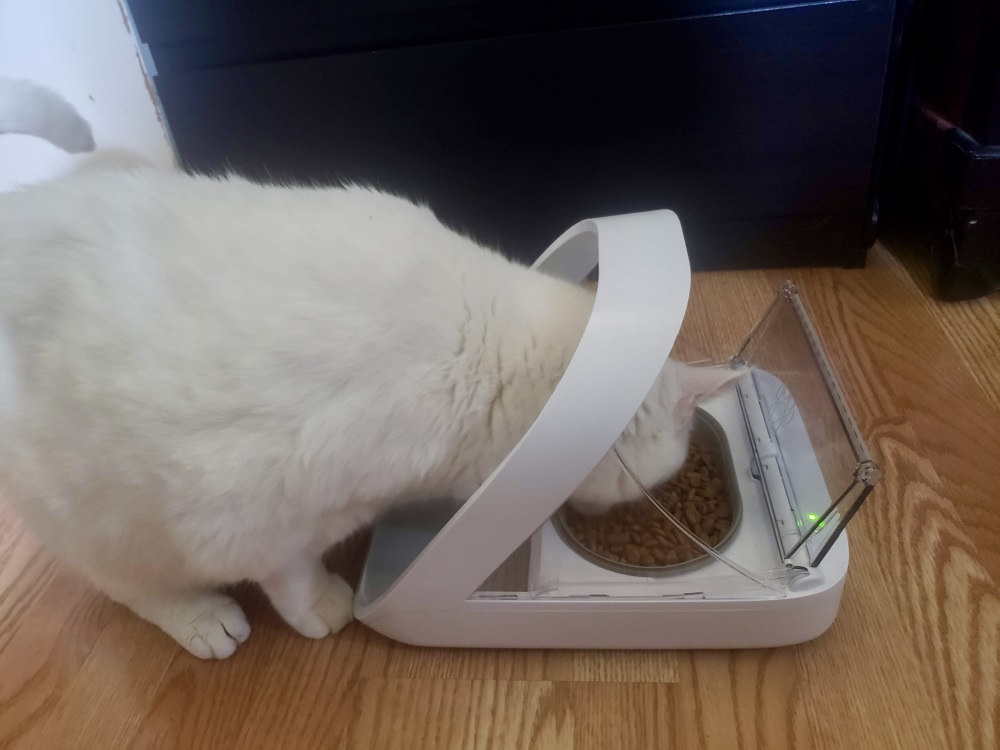
Liz Coleman / Cats.com
Positive Review:
“I have two of these feeders and they are awesome. They allow me to feed several different diets to my cats without fear my cats will eat the wrong food. SureFeed customer service is great. I work as a vet tech at a cat hospital and we recommend these feeders all the time.”
—CatVetTech, Chewy
For the most part, consumers are pleased with the Surefeed’s functionality and value. A lot of users observed that while pricey, a microchip feeder makes mealtime much easier. If you’re at your wits end feeding multiple cats different diets, it could be a real game-changer.
Negative Review:
“Bought 3 of these about a year ago and only 1 of them currently still works. WAY too expensive for them to turn into e-waste in a year.”
—PatB, Chewy
Unfortunately, a number of cat parents reported that the SureFeed malfunctioned after several months. (i.e. opening for the wrong cat, loud grinding noises, etc.) There were also frequent complaints about how expensive all the extra accessories were. Customers did not appreciate that after shelling out $200 for the feeder, they would need to spend more for stainless steel bowls, a rear cover, or colored mats.
Frequently Asked Questions
Are microchip feeders worth it?
They can be! The SureFeed isn’t a cheap item and it won’t make sense for every cat parent. But for multi-pet households where food-stealing is a constant battle, they can be a real lifesaver. They also ensure cats on prescription diets are getting the right food.
How do you train a cat to use a microchip feeder?
You'll have the most success by giving your cat time to adjust. The SureFeed includes a built-in training mode with four stages that leaves the door open slightly in different amounts. As your cat becomes accustomed to the movement at each stage, you can move on to the next one. Some cats with catch on quickly, while others may take as long as two weeks to become comfortable with their new feeder.
Do I need a microchip feeder for each of my cats?
It depends. If you have multiple feline thieves and they all steal from each other, you'll need a feeder for each cat. If there's only one culprit, you may just need one feeder for the cat who isn't stealing food.
 Fact checked by
Fact checked by

